To share heat and cold with the earth ... Women, teenagers and old people fed the country and the front
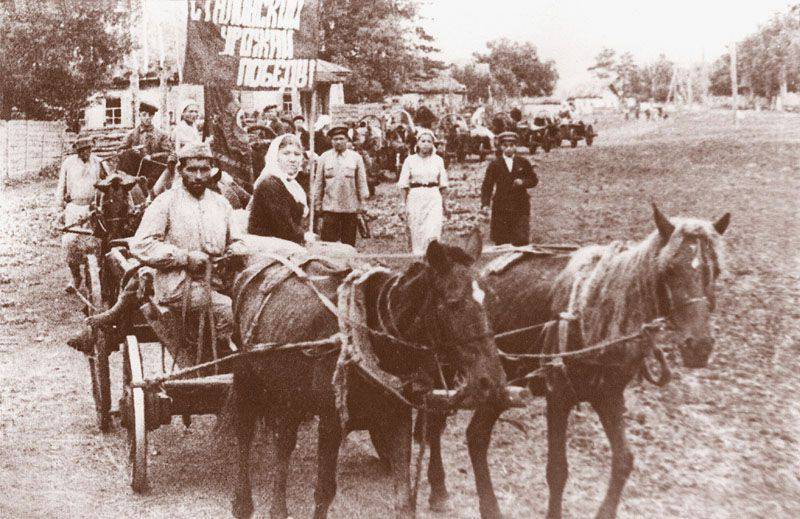
In 1941, Ukraine, Belarus, the Baltic States and the Kuban were under enemy occupation. The burden of supplying the country with food fell on the rear areas. But in rural areas, the number of able-bodied people decreased by almost a third compared with the pre-war 1940 year. Almost all trucks, tractors and horses were sent to the front. Field work had to be done manually. Women, teenagers and old people became the main labor force in the village. The diaries and memories of that time from the Ufa archives allow us to imagine how it all happened.
The war destroyed the whole range of rural life, the usual routine: children began to adult, cows - to horses, women girdled with belts, took wrenches in their hands, sat down at the tractor ...
A village without a man was defenseless and unsettled. In the peasant farms, in addition to the basic work on the field and in the forest, he knew how to do everything little by little. For this there was a tool - an ax, a saw, a hammer, a plane, a chisel, a chisel, pincers, an awl and a trench. Only for the special complexity of the tasks called a stove, roofer, glazier or konoval. Peasant versatility and kept the economy. The war also showed that there was nothing to replace it with — a woman with her dexterity and her cares would hardly fit into a man’s burden.
From the memoirs: the women mow the grass by the road, and their braids are not repulsed. They are noticed that the “navels,” that is, the transverse arms, are attached to the spit incorrectly, and the women respond: “There is no one to tie them up.”
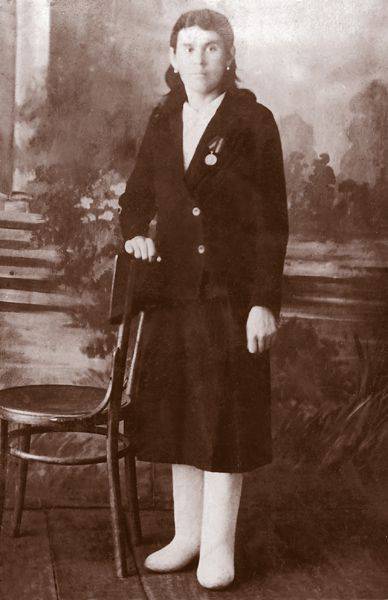
M.Sh. Fatykhova, chairman of the collective farm "Idelbuy" Dyurtyulinsky district of Bashkiria
Another memory. In the open air lie piles of flax, which they sowed in the spring, in the autumn they managed to put them in a pile, but they didn’t remove them with the beginning of the muddy road, they left to rot, not having pulled out the flaxseed. Nearby in the middle of the field some cars, cultivators and seeders that have grown into the frozen ground are rusting - they remained in the middle of the field in winter ...
Before the war in front of each village house in bulk lay logs brought for cutting. It was the most favorite place of children's games and fun. Now there was no aspen or birch reserves in front of the houses, there was burning brushwood in the heating, and straw in the treeless areas.
Zakhireli, transferred without care apiary - in the middle of summer the grass was wild above the hives. The trees in the gardens, too, sensing the weakness of the master's hand, began to deaden either one or several branches at a time, and sometimes an entire apple tree would dry out at once.
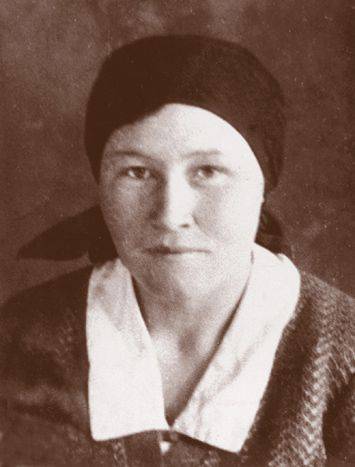
The foreman of the female tractor brigade, F.K. Kagarmanova. Dyurtyulinsky district, 1942
Haymaking in the village was considered one of the favorite activities. It was held together, united the villagers in the same field. The whole world went out for haymaking, stood nearby, with each other, in moments of rest - jest. At noon, we went together to stir up hay and break the swaths. Together they returned to the village with songs ... Now there was no more such haymaking, and if a song sounded too loud in the village, they reproached - “you sing, but people have grief”.
According to the recollection, the most difficult thing was to survive the winter months. Windows almost single-frame in the huts, always frozen. There was not enough firewood, and some village families, in agreement, wintered under the same roof. In the huts, where two families lived, the children were placed six to seven in a row. They almost never quarreled among themselves, they told each other fairy tales, read verses aloud, and riddles. When adults read letters from the front, the children listened, rejoicing and experiencing with everyone.
In the fall, snow covered entire fields with ripe, but not harvested, ears of corn. It is recalled that one year near the village a whole field of millet went under the snow. In the spring, hungry fellow villagers went there to collect spikelets. From flour from overwintered grains, diseases began.
The wife of the front-line soldier Tarif Valitov remained at home alone with four children. Their cow had a habit of calving very late. The children looked through the frozen windows into the courtyard and everyone waited for the cow to settle. The eldest daughter said: "You, cow, sometime stay and rejoin, but rejoice after our death." And so it happened - without waiting for calving and milk, the children were poisoned by frozen grain.
The symbol of a hungry year is the grass of quinoa. But at the end of the war they started talking about new food - fake leaves. They were dried, threshed in a hand mill, flour was baked cakes. They said that they would not tear the throat like a tortilla cake - a mash made of rotten potatoes harvested in the spring.
The monotonous winter life seemed endless. Anxiously awaited the arrival of spring - warm, bright, nourishing. In the spring, teenagers plowed the land, harrowed arable land, and old men manually sowed the fields. There were not enough tractors, horses, workers ...
Children and adolescents were thrown into full swing into adulthood. Village children, growing up and so early, the war immediately put on a par with adults. Adulthood was not advancing in the usual way for the boy to adult trades, but because in the house he was becoming the only peasant. If, before the war, a teenager who wanted to mow and cut firewood before the time was specially restrained, now the privileges of childhood have disappeared.
Due to the lack of teachers, children were not allowed to go on vacation for three months, but for five months - from May to October. Many people left school. This was more often due to hunger or lack of clothing.
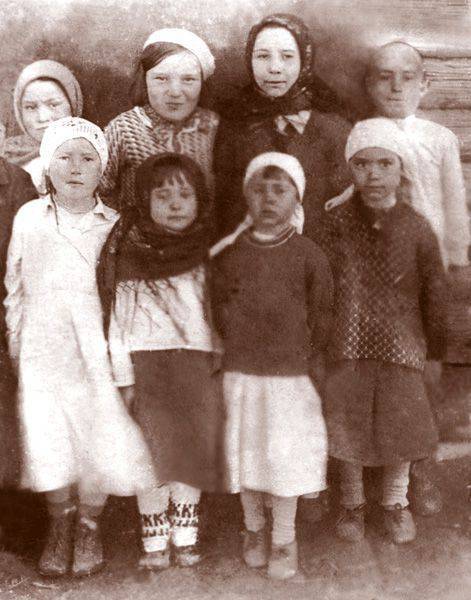
Village children of wartime. The village of Ishkarovo, Ilishevsky district, BASSR, 1942,
“For classes there were no books, notebooks, or pens with pencils,” recalled Ravil Yalchin, a resident of the Fedorovsky District of Bashkortostan. - Many of my classmates in September could not come to school - there were no clothes and shoes; only cold, hunger and poverty in every home. In the fourth grade, by the end of the school year, three students remained. Our power, modest and intelligent teacher Badi Khamzovna Yanbulatova asked us to invite the rest of the students to take the final exams: only nine people gathered. So we passed the final exams and finally completed our studies. ”
The boys, starting with 9-10 years, grazed cattle, fished, went into the woods to cut down a suitable tree and make an ax, knit the tops, cut down pine needles, dragged the bark. Girls for the same years have already spun, learned to weave, weave and sew, helped on the mowing, knew how to knead bread and put pies. Fourteen-year-olds were considered adults, demand and a sense of responsibility were appropriate. Teens could sow, harrow, and some helped and mow.
Memory. A student of the Ufa Aviation Institute, Nailya Teregulova, during the summer holidays, is sent to agricultural work in the village of Buzyurovo, Bakalinsky district, where her cousin lived. With her, she took the hotel - 400 grams of cut sugar. When a four-year-old neighbor girl came to her relatives, they decided to treat her. But the girl did not even know what sugar was, she began to play with these pieces ...
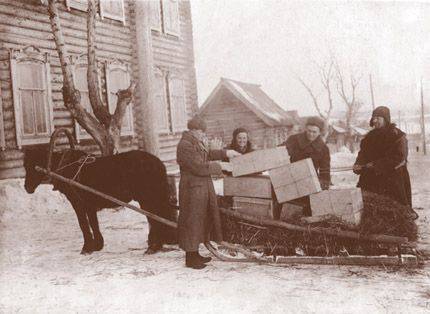
Sending parcels to the front. Dyurtyuli, 1942
Little remained in the village of tractors, a little more - combines. But who should work? At the beginning of 1942, in Bashkiria, there were a shortage of more than three and a half thousand tractor drivers, about one and a half thousand combiners. Urgently organized courses at MTS for women. Instead of the usual caps from the wheel looked out multicolored kerchiefs ...
Together with women and teenagers, old men took to the fields. Newspapers wrote: on the collective farm "Kyzyl Bairak" of Karaidel district, ninety-year-old Faiz Khasanov was grazing horses at night, and during the day went out on haystack and mowing bread. From old men organized brigades of mowers and reapers. On the collective farm “Yangi Yul” of the Chishminsky district, eighty-year-old Taifa Imasheva went to the harvest every day without sundays ...
More than four-fifths of the cultivated area in Bashkiria was cleaned by hand or by simple sweepers. The machinist mowers worked without changing the entire light part of the day. Horses could not stand, they were changed every four hours, people also worked for fifteen or eighteen hours.
But people still did not have enough. Then, from July to October, the population of all cities and workers' settlements of the republic mobilized for harvesting work. The beginning of studies in universities and technical schools was transferred from September 1 to October 15.
... They took for the onset of spring every wind from the south, but spring still did not come. The wind direction changed, but in the April air it smelled of February dampness. Then came May. During the day it was raining, at the very end of May night frosts became frequent.
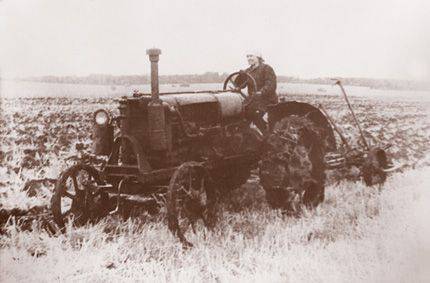
On arable land at the State Farm. Tsuryupy Ufa district. 1944
Spring sowing began later than usual. At the beginning of May, selective field work began in only a few central regions. Massive sowing in the western, southeastern and northwestern regions of Bashkiria began after 9 in May, and in the northern and trans-Ural regions at the end of the month. By the beginning of the sowing of horses and tractors in the villages almost no more. The areas for sowing had to be prepared in the spring - in the fall the fields were not plowed.
In Fedorovsky district, in the south of the republic, 12 began sowing on May. The rivers had already returned to the banks, the water remained only in barrels on the sides of the road, and the landmarks on the sidelines, which marked the winter route, were still stuck.
The lands of the third brigade stretched at the foot of Myshagyr to the crest of the Nine Tents. The brigade consisted of girls and teenage boys who harrowed their feet, leading the horses on occasion, and seventeen-year-old Ravil Yalchin, who was in charge of the older one, was sitting on the only horse seeder in the brigade. Rabig Abdrakova and sixteen-year-old Agzam Kulushev worked as grooms, and Gainizap Valitova and Rakiya Mustafina carried grain to the Sterlitamak elevator on two pairs of horses. Each of the workers received daily welds for lunch from crushed oats with husks.
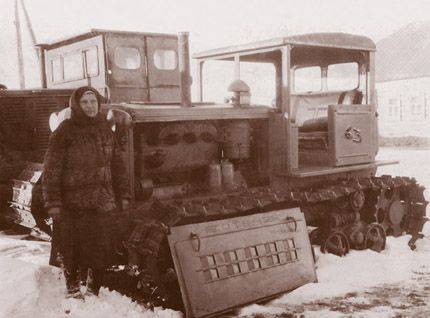
Tractor driver E.P. Tashkinova Andreevskoy motor and tractor station Ilishevskogo region BASSR
To work in the field you need a shoe. Boots took care. Ravil Yalchin recalled that grandmother had old Saryks with lotus-shaped patterns. Together with the trousers, patched on the knees, they gave him such a look - it is embarrassing to look in the mirror - but nothing can be done ...
The tractor at the machine-tractor station somehow collected, but not enough fuel. When two old brigadiers appeared on the collective farm who had returned for an amendment, the whole village asked the military registration and enlistment office to give them a reservation.
Work in the fields was from dawn to dusk, and the tractor drivers worked at night. There was a sixteen-year-old Askhat among them, so tiny that it was not visible behind the wheel. Those who are older will sit under a barrel and watch: the motor hums, the light moves - it means that Askhat is plowing. But it happened - the light stopped, the motor stalled, the tractor was standing, the lamp was on, and the tractor driver with the hitch got under the warm engine to warm up and fell asleep. They will be stirred up - they will work a little more. Older waving their hands and sit behind the wheel. "It was with such eagles that the agriculture was waged in the war."
The girls in the brigade, in spite of hunger and fatigue, were laughable, the Yugoslavs, in their eyes shone the natural thirst for life. Sang: "Soviet form - one hundred grams is the norm."
Information